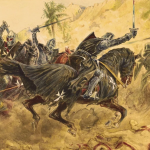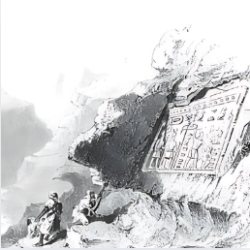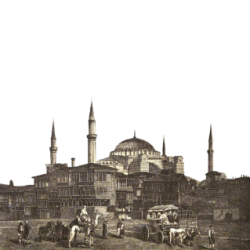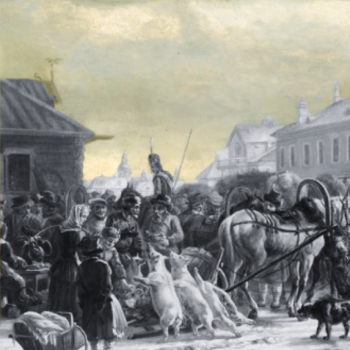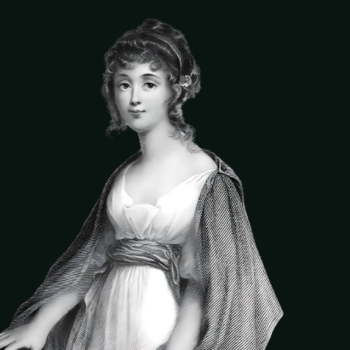A Tournament Of Shadows
IV. The King Of Fire
After successfully evading the detection of Admiral Horatio Nelson of Britain’s Royal Navy for thirteen days, Napoleon and the French fleet landed in Alexandria on July 1, 1798, the minarets of Alexandria announcing that his point was gained.[1] As he was reconnoitering the coast a strange sail appeared on the verge of the horizon. “Fortune!” exclaimed Napoleon. “I ask but six hours more—wilt thou refuse them?” The vessel proved to be French, not, and the disembarkation near the Tower of Marabout, three leagues to the eastward of Alexandria, immediately took place (despite a violent gale and tremendous surf.)
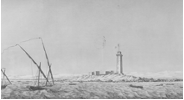
Tower of Marabout.
Though Egypt had been a part of the Ottoman Empire since 1517, it was essentially ruled as a vassal state of semi-feudalism. The pashas (an honorific similar to a British lord) appointed by the Ottomans were “rulers” by name only. The actual authority of the country belonged in the hands of beys (petty lords) known as the Mamluks (descendants of slave-soldiers of the Turks, many from the Caucasus and Georgia.) These Mamluks honored neither pasha nor Sultan (supreme ruler of the Ottomans,) and though they promised a symbolic tribute to every new pasha that was appointed—it was almost never paid.[2] Part of Napoleon’s plan was to dredge up animosity among the Arab populations against their foreign rulers. A reformist movement was already underway known as Wahhabism, founded by Abd al-Wahhab, a scholar who belonged to the puritanical Hanbali school of Islamic thought (anti-Shia, anti-Sufi, etc.) His philosophy was much indebted to the fourteenth-century jurist, Ibn Taymiyya, an idealogue who popularized the notion of militant jihad.[3]
“Soldiers,” Napoleon told his men upon landing. “You are about to undertake a conquest whose effect upon the civilization and the commerce of the world will be incalculable. You will inflict upon England the severest stroke—a stroke which she will feel most, till you can give her the deathblow. We shall make some fatiguing marches, we shall fight some battles, we shall succeed in all our enterprises; the destinies are for us. The Mamluk Beys, who favored English commerce, who loaded our merchants with arbitrary imposts, and tyrannized over the unhappy inhabitants of the Nile, a few days after our arrival will exist no longer. The people with whom we are about to live are Mahommedans (Muslims); their first article of faith is this—‘There is no other God than God, and Muhammed is his prophet.’ Do not contradict them. Act towards them as you have done towards the Jews and the Italians. Treat those Muftis and Imans with respect, as you have Rabbis and Bishops. Have the same toleration for the ceremonies which the Qur’an prescribes and for the mosques, as you have had for convents and synagogues, for the religions of Moses and of Jesus Christ. These people treat women otherwise than we do—but in every country the ravisher is a monster. Pillage enriches only a few—it dishonors us, it destroys our resources, it makes the people our enemies, whom it is our interest to have for friends. The first town which we shall enter was built by Alexander. At every step we shall find great recollections worthy to excite the emulation of the French.”[4]
The Arabs received this bulletin with disdain, and among themselves, the soldiers laughed it off, for if the soldiers had no religious convictions, they certainly had a proud feeling of their moral superiority. This obstacle made Napoleon regret that he did not live in ancient times when conquerors had no such scruples. He envied the power of his hero, Alexander the Great, who proclaimed himself the son of Jupiter Ammon which, in Napoleon’s estimation, had been worth more to him in his subjugation of Egypt and the Holy Land than twenty battles gained.[5]
At three o’clock in the morning, Napoleon commenced his march upon Alexandria with three divisions of his army. He had little difficulty in entering the city, although he met some resistance in a scrimmage during which General Kléber was wounded and two hundred men lost their lives. Napoleon then made an announcement to the people of Alexandria.
“It is now a long time that the Beys have in the French nation and oppressed its merchants,” said Napoleon. “The hour of their chastisement is come. It is now a long time that these slaves of Caucasus and Georgia have tyrannized over the finest part of the globe, but God, who orders everything, has now destined their end. People of Egypt—they tell you that I come to destroy your religion, do not believe them. Answer to them, that I come to restore your rights, and that I honor more than the Mamluks God, his Prophet, and the Qur’an. Tell them that all men are equal before God, and that wisdom, talent, and virtue, are the only just grounds of distinction. But where is this wisdom, these talents, and these virtues in the Mamluks, that they should exclusively seize all that makes life valuable. Is there a beautiful region; it belongs to the Mamluks. Is there a beautiful slave, a fine horse, or a magnificent house, whose is it but the Mamluks—And why so—If Egypt be their farm, let them show the by which God has given it to them. There are in your region great cities, great canals, and a great commerce; and who has destroyed them all, but the avarice, the injustice, the tyranny of these Mamluks. Qadis, Sheiks, and Imams tell the people that we are true Mussulmen (Muslims.) Is it not we, who destroyed the Pope, the Christian enemy of Mussulmen. It was this army, who destroyed the Chevaliers of Malta, and the enemy of your faith. Have we not always been the friends of the Grand Signor, (whose designs may God accomplish) and the enemies of his enemies. Thrice happy are they who shall be with us; they shall prosper in their fortunes. Happy those, who shall be neuter; they will have time to know us, and they will join us also. But thrice woe to those who take arms for the Mamluks; there shall be no hope for them; they who shall take arms against the French army shall be burned. Let everyone return thanks to heaven for the destruction of the Mamluks; let them exclaim, glory to the Sultan; glory to the French army his ally. Curse upon the Mamluks, and happiness for the people of Egypt.”[6]
Napoleon considered the Mamluks to be individually the finest cavalry in the world. They rode the noblest horses of Arabia and were equipped with the best weapons the world could produce—carbines, pistols from England, and sabers of steel from Damascus. Their skill in horsemanship matched their fiery valor. “With that cavalry and the French infantry,” Napoleon said, “it would be easy to conquer the world.” Napoleon remained some days in Alexandria, departing on July 7, and leaving General Kléber in command. He was anxious to force the Mamluks into an encounter with the least possible delay. General Desaix was sent forward to Beda with 4,500 men. The commission of savants remained at Alexandria until Napoleon should reach Cairo. The march over the burning sands of the desert brought terrible misery and unimaginable sufferings upon the troops. The air was thick with pestiferous insects, and the glare of the sand weakened the men’s eyes. Water was scarce and bad. Even the gallant spirits of Murat and Lannes began to fail. Unable to sustain themselves, in a fit of rage, in the presence of their men, they trampled their brilliant cockades in the sand.
“Is this where the general designs to give us our seven acres of land?” the common soldiers asked with sarcastic murmurs.
On July 10 the army reached the Nile at Rahmaniya. As soon as they saw the river, the soldiers all rushed into it, caring not if it was sufficiently shallow to afford security from danger. The army soon moved on towards Cairo. Although near the Nile, several men fell dead from thirst for they were unable to leave the ranks for even a single moment without certain death from the spear or scimitar of a Mamluk horseman. It was in this state, on July 13, when they met the Mamluks at Chebreis, a magnificent cavalry mounted on splendid horses, and glittering with gold and silver. They were led by Mourad Bey, one of their most powerful chiefs. The battle commenced without hesitation on either side.
Every Mamluk rushed in the singleness of his purpose, as if each alone stood against the invading mass. Endeavored by every means of unbridled fury, they repeated their charges with consummate skill to break the solid squares of the French army. At length they were beaten back, losing about three hundred men. After the battle at Chebreis, the French army continued to advance. It was eight days before they again faced the opposition of their enemy (except, of course, the hovering Arabs who laid in wait for every straggler from the main column.) The order of march towards Cairo was systematically arranged. Each division of the army moved forward in squares six men deep on each side. Artillery was at the angles. In the center was the ammunition, the baggage, and what remained of the cavalry. Napoleon himself when he rode, always made use of a camel, though initially he suffered a sensation reminiscent of seasickness.
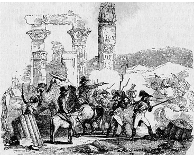
Battle at Chebreis.
On July 19, the sight of the Pyramids on the horizon gladdened the hearts of the soldiers. Still advancing towards Cairo, the enigmatic monuments swelled upon the eye at every step. The army reached Imbaba on July 21, and found the Mamluks in battle array, quite prepared to dispute further progress of the French. Napoleon sighted with his telescope a vast army of the enemy spread out before him. On the right, they were posted on an entrenched camp by the Nile, their center and left composed of cavalry. Napoleon realized that the 40 pieces of cannon in the Mamluk camp were without carriages and could therefore only be leveled in one direction. He quickly decided on his plan of attack. He would throw his forces on the left where the Mamluk guns could not be available. Murad Bey, who commanded the Mamluks, met Napoleon’s design and led his followers in a gallant advance to the encounter.
“Soldiers,” said Napoleon, “you are about to fight the rulers of Egypt.” He raised his hands high in the air to form his troops into separate squares to meet the assault. “From the summits of yonder pyramids, forty centuries behold you.”
These ancient monuments were not appealed to in vain, for the great battle began immediately at the foot of those imposing and mysterious witnesses. The French advanced in five squares, Napoleon heading the center square. In an instant, the Mamluks came charging up with impetuous velocity. Shouting loud, they crashed into the line of bayonets, backed their horses upon them, and maddened by the lines which they could not penetrate, dashed their pistols and carbines into the faces of the French troops.
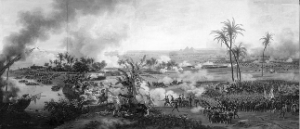
Battle Of The Pyramids.
The first maneuvre of the French disconcerted the plans of the Mamluks, yet they continued to charge. The places of the dead and dying were instantly replenished with the bodies of new warriors who fell in their turn. The desperate horsemen were exposed to the incessant fire. Those under the tricolor who fell wounded from their saddles, crawled along the sand where their enemies hewed at their legs with scimitars. Nothing, however, could move the intrepid French, whose continued roll of musketry thinned their Mamluk host by degrees. Napoleon at last advanced with his battalions upon the main body of the enemy, dividing one part from the other. The Mamluks were in such a state of confusion and terror, that they abandoned their works and flung themselves into the Nile. Thousands were left bleeding out on the sands of the Sahara. Multitudes more were drowned. The carnage was prodigious. Napoleon’s name spread panic through the East. Owing to the deadly effect of the musketry during the engagement at the Pyramids, the inhabitants called him “King of Fire.”[7]
SOURCES
[1] Mattelart, Armand. (trs.) Emanuel, Susan; Cohen, James A. Mapping World Communication: War, Progress, Culture. University Of Minnesota Press. Minneapolis, Minnesota. (1994): vii.
[2] Bowen, John Eliot. “The Conflict Of East And West In Egypt.” Political Science Quarterly. Vol. I, No. 2 (June 1886): 295-335.
[3] Allen, Charles. “The Hidden Roots of Wahhabism in British India.” World Policy Journal. Vol. XXII, No. 2 (Summer 2005): 87-93.
[4] Miot, Jacques François. Narrative Of The French Expedition In Egypt, And The Operations In Syria. J. Davis. London, England. (1816): 166.
[5] Evans, Harry R. The Great Pyramid And Napoleon. Hartman & Cadick. Washington, D.C. (1895): 13.
[6] Miot, Jacques François. Narrative Of The French Expedition In Egypt, And The Operations In Syria. J. Davis. London, England. (1816): 167.
[7] Gibbs, Montgomery B. Military Career Of Napoleon The Great. The Saalfield Publishing Co. New York, New York. (1895): 113-120.



